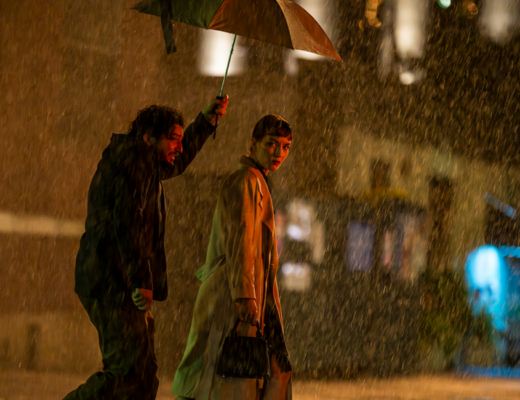Night in Paradise scans like any number of slow-burn gangster flicks, but suffers for lack of originality in both its action and drama.
Park Hoon-jung’s Night in Paradise does little to differentiate itself from other gangster movies, especially others made in Korea like Park’s own New World. Found here is the standard slick, blue-hued photography, violent action, and superficially cool world of bad men in good suits that one expects from the genre. If there’s anything that sets this iteration apart, it’s a melodramatic and sentimental streak that lends the film an unusual but pleasant languor in the long stretches between action pieces. It’s also all more than a little overbearing, however. Park Tae-goo (Uhm Tae-goo) is a gangster on the run after he attacks a rival boss responsible for the death of his sister and niece. If the assault on his family wasn’t enough, Tae-goo’s sister was dying of disease anyway, and since he is only her half-brother, he is incompatible for the vague transplant she would have needed. He’s very anguished, you see, and his emotions are only complicated when he finds himself hiding out in Jeju with an aging gangster and his niece, Jae-yeon (Jeon Yeo-been), who is as terminally ill as Tae-goo’s sister was. Tae-goo and Jae-yeon spend much of the rest of the film together, and the initial friction brought on by mutual detachment eventually gives way to something of a bond. But for however much time they spend together eating mulhoe and lightly flirting, by the end the relationship plays like a simple raising-of-the-stakes; no matter how much time is spent with the two morosely discussing their impending dooms, it rarely amounts to more than shallow and approachable nihilism. They might come to enjoy each other’s company, but neither changes in a meaningful way or works toward any catharsis. As a result, what Park so clearly intends to be the meat of his film instead presents as little more than connective fibers, the film slowly limping along to its conclusion. Eventually, Tae-goo’s actions catch up to him, and Jae-yeon is put in danger, of course. There are a few fun surprises in seeing how this plays out, but it’s still disappointing to see the one thread that sets Night in Paradise apart flattened for the sake of its more generic conventions, rendering all of its sentiment empty table setting.
Maybe it’s only recency that calls it quickly to mind, but the gangster-on-the-run-during-a-gang-war premise reminds of Diao Yinan’s Chinese neo-noir The Wild Goose Lake, a comparison that does Park’s film few favors. While the two share a vagueness of character and slow-burn pacing, Diao’s film is spilling with style — its neon-shoed foot chase is only one of many unforgettable examples — and smart setpiece construction, both of which Night in Paradise could desperately use. It’s not that the action sequences are ineffective, but they do little to stand out in either extremity or form, and thus play like lesser versions of scenes from similar films. A second act car chase, which folds in a one-versus-a-dozen knife fight, somehow feels forgettable, like the entire crew is just going through the bare motions. A late-film shootout plays out like Chow Yun-fat’s early A Better Tomorrow rampage, only more ridiculously one-sided and obviously lacking in the Woo touch. There’s not much of anyone’s touch felt here, for that matter, and Night in Paradise‘s lack of personality renders it dull in both its conventional action scenes and in the connective tissue that Park only pretends to be interested in.
You can currently stream Park Hoon-jung’s Night in Paradise on Netflix.







